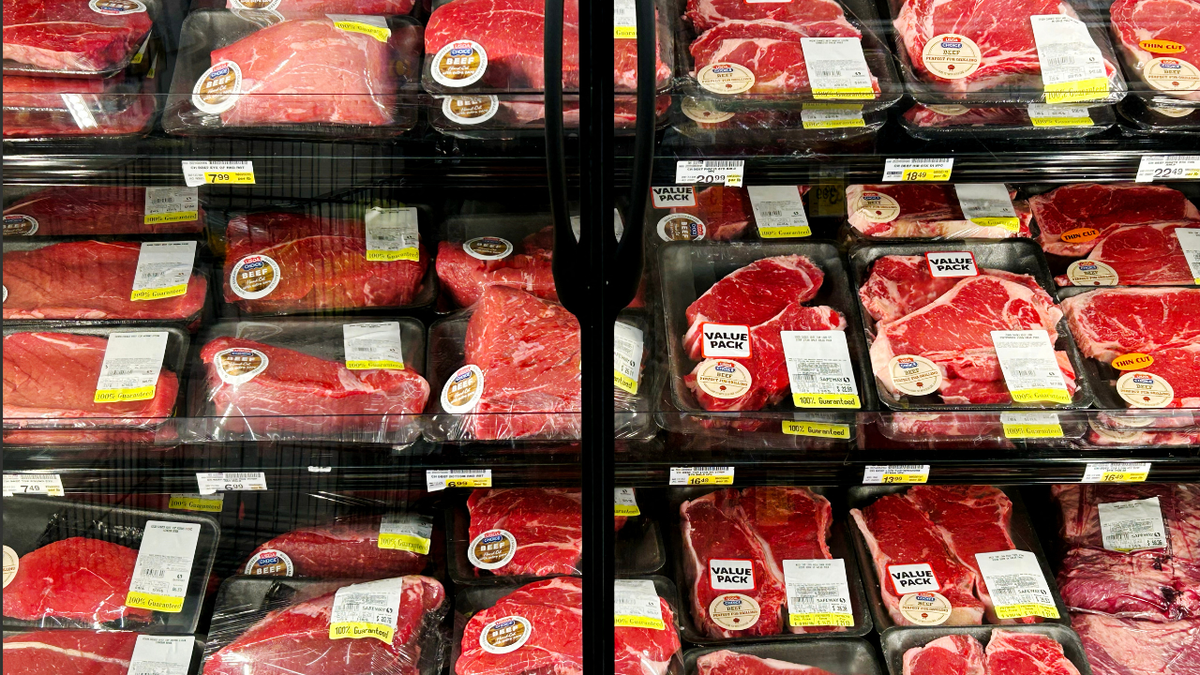INTERNACIONAL
Trump nominees pile up as GOP weighs rule shift once floated by Democrats

NEWYou can now listen to Fox News articles!
Senate Republicans are getting closer to changing the upper chamber’s rules to allow for a slew of President Donald Trump’s lower-level nominees to be confirmed, and they’re closing in on a revived proposal from Democrats to do it.
The hope among Republicans is that using a tool that Senate Democrats once considered would allow them to avoid turning to the «nuclear option,» meaning a rule change with a simple majority vote.
«The Democrats should support it, because it was their original proposal that we’re continuing on,» Senate Majority Whip John Barrasso, R-Wyo., told Fox News Digital. «And I wouldn’t be surprised if they won’t. This historic obstruction by the Democrats is all playing to their far-left liberal base, who hate President Trump.»
REPUBLICAN DOCTORS CLASH WITH RFK JR OVER VACCINES IN TENSE SENATE SHOWDOWN
Senate Republicans are eyeing a Democratic proposal from years ago to change the Senate’s rules to ram President Donald Trump’s nominees through Senate Democrats’ blockade. (Aaron Schwartz/CNP/Bloomberg via Getty Images)
Republicans met throughout the week behind closed doors to discuss their options and have begun to coalesce around a proposal that would allow them to take one vote to confirm a group of nominees, also known as «en bloc,» for sub-Cabinet level positions.
So far, the only nominee to make it through the Senate with ease was Secretary of State Marco Rubio in January. Since then, various positions throughout the bureaucracy have stacked up and have not received a voice vote or gone through unanimous consent — two commonly-used fast-track procedures for lower-level positions in the administration.
Senate Majority Leader John Thune, R-S.D., said that before Senate Minority Leader Chuck Schumer, D-N.Y., was in charge of the Democrats, «this was always done in a way where, if you had some of the lower-level nominees in the administration, those were all voted en bloc, they were packaged, they were grouped, they were stacked.»
«This is the first president in history who, at this point in his presidency, hasn’t had at least one nominee clear by unanimous consent or voice vote,» he said. «It is unprecedented what they’re doing. It’s got to be stopped.»
TOP SENATE REPUBLICAN READY TO GO NUCLEAR, ‘ROLL OVER’ DEMOCRATS WITH RULE CHANGE TO CONFIRM TRUMP NOMINEES

Senate Majority Leader John Thune, R-S.D., heads to the Senate chamber on Jan. 22, 2025, in Washington, D.C. (Kayla Bartkowski/Getty Images)
And the number of nominees on the Senate’s calendar continues to grow, reaching 149 picks awaiting confirmation this week. The goal would be to make that rule change before lawmakers leave town for a week starting Sept. 22.
The idea comes from legislation proposed in 2023 by Sens. Amy Klobuchar, D-Minn., Angus King, I-Maine, and former Sen. Ben Cardin, D-Md. Republicans are eyeing their own spin on it, such as possibly not limiting the number of en bloc nominees in a group or excluding judicial nominees.
Republicans would prefer to avoid going nuclear — the last time the nuclear option was used was in 2019, when then-Senate Majority Leader Mitch McConnell, R-Ky., lowered debate time on nominees to two hours — but they are willing to do so, given that Democrats haven’t budged on their blockade.
They may only be making a public display of resistance, however.
«Democrats privately support what Republicans are talking about,» a senior GOP aide familiar with negotiations told Fox News Digital. «They’re just too afraid to admit it.»
Sen. James Lankford, who worked with Thune and Barrasso over the recess to build a consensus on a rule change proposal, told Fox News Digital that his Democratic colleagues acknowledged that they’ve «created a precedent that is not sustainable.»
TRUMP THREATENS LAWSUIT OVER ‘BLUE SLIPS’ AS TOP GOP SENATOR BUCKS DEMAND TO BEND SENATE RULES FOR NOMINEES

The idea comes from legislation proposed in 2023 by Sen. Amy Klobuchar, D-Minn., among others. (Bloomberg/Getty)
«But then they’ll say, ‘but my progressive base is screaming at me to fight however I want to. I know I’m damaging the Senate, but I got to show that I’m fighting,’» the Oklahoma Republican said.
«We feel stuck, I mean, literally,» Lankford continued. «Some of my colleagues have said, ‘We’re not the ones going nuclear. They’re the ones that are going nuclear.’»
Klobuchar told Fox News Digital that she appreciated the prior work she’s done with Lankford on «ways to make the Senate better» but wasn’t ready to get behind the GOP’s version of her legislation.
«When I proposed that, it was meant to pass as legislation, which means you would have needed bipartisan votes, and the reason that’s not happening right now is because the president keeps flaunting the law,» she said.
CLICK HERE TO GET THE FOX NEWS APP
Not every Senate Democrat is on board with the wholesale blockade, however.
Sen. John Fetterman, D-Pa., told Fox News Digital that lawmakers should all behave in a way in which administrations, either Republican or Democratic, get «those basic kinds of considerations» for nominees.
«That’s not the resistance,» he said. «I just think that’s kind of unhelpful to just move forward. I mean, you can oppose people like the big ones, whether it’s [Health and Human Services Secretary Robert F.] Kennedy or others.»
Fox News Digital reached out to Schumer’s office for comment but did not immediately hear back.
senate,donald trump,chuck schumer,politics
INTERNACIONAL
US kills 6 suspected narco-terrorists in overnight strike on alleged drug smuggling boat, Hegseth says

NEWYou can now listen to Fox News articles!
President Donald Trump directed a nighttime U.S. strike on a suspected Tren de Aragua vessel in the Caribbean Sea, killing six alleged narco-terrorists, officials say.
«Overnight, at the direction of President Trump, the Department of War carried out a lethal kinetic strike on a vessel operated by Tren de Aragua (TdA), a Designated Terrorist Organization (DTO), trafficking narcotics in the Caribbean Sea,» War Secretary Pete Hegseth announced on X sharing an accompanying video of the strike. «The vessel was known by our intelligence to be involved in illicit narcotics smuggling, was transiting along a known narco-trafficking route, and carrying narcotics.»
«Six male narco-terrorists were aboard the vessel during the strike, which was conducted in international waters — and was the first strike at night,» he said. «All six terrorists were killed and no U.S. forces were harmed in this strike.»
HEGSETH SAYS US CONDUCTED ANOTHER STRIKE IN EASTERN PACIFIC TARGETING ALLEGED NARCO-TRAFFICKERS
This infrared image released by the Department of War shows a suspected Tren de Aragua vessel in international waters of the Caribbean Sea before a U.S. nighttime strike that killed six alleged narco-terrorists, officials said. (Department of War/Pete Hegseth)
Hegseth further warned, «If you are a narco-terrorist smuggling drugs in our hemisphere, we will treat you like we treat [al Qaeda]. Day or NIGHT, we will map your networks, track your people, hunt you down, and kill you.»
The strike marks the 10th operation targeting suspected drug traffickers since Trump returned to office. The president has made combating the nation’s drug crisis a central policy focus.
The first strike took place on Sept. 2, and since then, 43 suspected drug traffickers have been killed and two have survived, officials said. The pace of the strikes has increased from one every few weeks in September to three so far this week.
The operations have mostly targeted vessels linked to Venezuela’s Tren de Aragua network. The missions have ranged from attacks on smuggling boats to the destruction of a submersible, with footage of several operations released by Hegseth and Trump on social media.
TRUMP APPROVES MILITARY ACTION AGAINST LATIN AMERICAN CARTELS CLASSIFIED AS TERRORIST ORGANIZATIONS

War Secretary Pete Hegseth announced the latest strike Friday morning. (Andrew Harnik/Getty Images )
When reporters asked Trump on Thursday whether he would request Congress issue a declaration of war against the cartels, he said that wasn’t the plan.
«I think we’re just going to kill people that are bringing drugs into our country, OK? We’re going to kill them, you know? They’re going to be like, dead,» Trump said during a roundtable at the White House with homeland security officials.
Trump this month declared drug cartels to be unlawful combatants and said the U.S. was in an «armed conflict» with them.
Members of Congress from both sides of the aisle are questioning Trump’s decision to launch the operations without first consulting lawmakers. Several Democrats are warning that the strikes could breach international law.
Sen. Rand Paul, R-Ky., has also raised concerns about killing people without due process and the possibility of killing innocent people.
CLICK HERE TO GET THE FOX NEWS APP

An infrared image released by the Department of War shows debris and smoke following a nighttime strike on a suspected Tren de Aragua vessel in international waters of the Caribbean Sea. Officials said six alleged narco-terrorists were killed in the operation. (Department of War)
In a recent interview, Paul cited Coast Guard statistics that show a significant percentage of boats boarded for suspicion of drug trafficking are innocent.
The senator has also argued that if the administration plans to engage in a war with Venezuela, as it has targeted boats in recent weeks it claims are transporting drugs for the Venezuela-linked Tren de Aragua gang, it must seek a declaration of war from Congress.
Fox News’ Landon Mion and The Associated Press contributed to this report.
narco terror,military,pete hegseth,donald trump,secretary of defense,world,drugs
INTERNACIONAL
Trump’s beef import plan ignores key issue squeezing American cattle ranchers

NEWYou can now listen to Fox News articles!
While President Donald Trump’s proposal to import more beef from Argentina is billed by the administration as a way to bring down prices for American consumers, critics say it misses the real issue driving costs at the grocery store: corporate concentration in the U.S. meatpacking industry.
Four corporations — Tyson, JBS, Cargill and National Beef — anchor the U.S. beef supply chain, with pricing power that reaches from pasture to plate. As a result, the gap between what producers are paid for cattle and what consumers spend on beef has remained wide, a reflection, economists say, of how market power is distributed along the supply chain.
Fox News Digital reached out to all four companies for comment but did not receive a response as of publication.
TRUMP ADMIN EYES ARGENTINE BEEF IMPORTS AS DOMESTIC PRICES SOAR TO RECORD HIGHS
Some critics argue the real problem isn’t about supply, it’s the corporate giants controlling America’s meat industry. (Melina Mara/The Washington Post/Getty Images)
The frustration extends beyond farm country – Rep. Thomas Massie, R-Ky., says the dominance of multinational meatpackers is hurting both producers and consumers.
«Four corporations control 85% of the meat sold in the United States. One of these corporations is Chinese-owned and one is Brazilian-owned. American farmers are being squeezed and American consumers are being gouged,» Massie told Fox News Digital.
Massie, who raises cattle on his Kentucky ranch, warned that expanding beef imports from Argentina would only worsen those structural problems.
«Flooding the market with Argentinian beef is not the answer to these problems. An America First solution to rising beef prices is to pass my PRIME Act, which would empower American farmers to sell directly to consumers without interference from global corporate middlemen,» Massie said.
Under current federal law, beef processed at small, state-inspected facilities can’t be sold across state lines, even if it meets the same health standards as federally inspected meat. Massie’s PRIME Act would remove that barrier, a change supporters say would let local ranchers reach more consumers and compete with the big packers.
GOP LAWMAKERS WARN TRUMP’S ARGENTINA BEEF PROPOSAL COULD RATTLE US RANCHERS

Agriculture Secretary Brooke Rollins recently unveiled a plan aimed at strengthening the U.S. cattle industry. (Ty Wright/Bloomberg/Getty Images)
Economists agree the beef market is highly consolidated, but say the forces shaping prices go well beyond any one trade deal.
Glynn Tonsor, a professor of agricultural economics at Kansas State University, told Fox News Digital that strong consumer demand continues to drive beef prices higher, regardless of supply fluctuations.
«There’s nothing that forces me or you or anybody else when we go into the grocery store to pay more for beef. People are choosing to,» he said. «The consumer desire for beef is strong and, regardless of the supply-side situation, that has the effect of pulling prices up.»
He also noted that the large-scale structure of the U.S. meatpacking industry, often criticized by ranchers and lawmakers, has economic benefits for consumers.
«I would argue that those economies of scale benefit consumers,» Tonsor said. «The ability to operate at a cheaper cost per head and, ultimately, per pound produced gives us the ability to offer beef and every other item we’re talking about at a cheaper price. Anything we do that loses those economies of scale actually hurts consumers in the form of higher prices.»
FROM CATTLE TO CRUDE: HOW TRUMP’S TARIFFS ARE RATTLING THE LONE STAR STATE

The White House has previously said that importing beef will help address the rising food costs in the U.S. (Jim Watson/AFP/Getty Images)
Derrell Peel, a professor of agricultural economics at Oklahoma State University, said that even if U.S. imports from Argentina increase, the impact on overall prices would be negligible.
«Most of what we import is lean, processed beef trimmings used for ground beef,» said Peel, who specializes in livestock marketing. «We’re not talking about the kind of beef that affects steak prices. Even if we doubled imports, it would be such a small share of the total supply that we wouldn’t detect any real impact.»
Peel added that there’s no quick way to ease pressure on cattle prices, since it takes roughly two years to bring animals to market and several years to rebuild herds.
«The fact of the matter is there’s really nothing anybody can do to change this very quickly,» he said. «We’re in a tight supply situation that took several years to develop, and it’ll take several years to get out of it.»
BEEF PRICES HIT RECORD HIGHS AS NATIONWIDE CATTLE INVENTORY DROPS TO LOWEST LEVEL IN 70 YEARS

Economists say there’s no quick way to ease pressure on cattle prices or beef. (Ricky Carioti/The Washington Post/Getty Images)
CLICK HERE TO GET THE FOX NEWS APP
Meanwhile, the White House defended the plan, saying it’s aimed at balancing relief for consumers with long-term support for U.S. cattle producers.
«The president loves our ranchers, and he also loves American consumers, and he wants to do right by both,» White House press secretary Karoline Leavitt said on Wednesday.
Leavitt said Trump’s immediate goal is to lower beef prices by increasing supply through additional imports, while a separate, long-term plan will focus on strengthening the domestic cattle industry.
She pointed to a three-part plan announced by Agriculture Secretary Brooke Rollins, which includes expanding grazing access, easing regulations for new ranchers, cutting inspection costs and improving «Product of USA» labeling to ensure consumers know when they’re buying American-made beef.
trade,texas,finance global economy,south america,white house,republicans elections
INTERNACIONAL
Una mujer estuvo cinco años secuestrada en un garaje por una pareja: le daban papilla con detergente y le vaciaron la cuenta

Una mujer de unos 40 años estuvo secuestrada durante cinco años por su propia compañera de casa y la pareja de esta, quienes la sometieron a torturas y la despojaron de todos sus bienes. El caso estremecedor ocurrió en la tranquila localidad de Saint-Molf, un pueblito de apenas 2800 habitantes del oeste de Francia, que quedó conmocionado.
El calvario terminó el 14 de octubre, cuando la víctima logró escapar y pedir ayuda a los vecinos. El caso salió a la luz y la Fiscalía de Nantes imputó a la pareja por “secuestro con tortura”.
Leé también: Horror en Brasil: un hombre mató a su exnovia trans a golpes y pisotones en la cabeza
Cinco años de encierro y maltratos
Todo comenzó cuando la víctima compartía la casa con una mujer de unos 60 años, que trabajaba como auxiliar de enfermería en un hospital. La situación cambió cuando la mujer llevó a vivir a su pareja, un hombre de 82 años. Desde ese momento, la víctima fue aislada, encerrada y despojada de su dinero y ayudas sociales.
Según el relato de la propia víctima, primero la obligaron a vivir en una carpa en el jardín y, más tarde, la encerraron en el garage. “Dormía en una reposera, hacía sus necesidades en un balde y bolsas de plástico, y comía papilla mezclada con detergente”, detalló el fiscal de Nantes, Antoine Leroy.
A la víctima le vaciaron la cuenta. (Foto: AFP/Sébastien Salom-Gomis).
Durante años, la mujer soportó el frío, la lluvia y el hambre, y solo en contadas ocasiones pudo salir al exterior. Desde 2022, no hubo más rastros de su vida: sus cuentas bancarias quedaron vacías y los últimos movimientos fueron transferencias a la cuenta de la acusada, informó la radio France Bleu.
Leé también: Una mujer irá a la cárcel por la muerte de su bebé: lo dejó solo con un pitbull peligroso que lo mató
La fuga desesperada y el rescate
La pesadilla terminó la noche del 14 de octubre, después de la cena. La víctima aprovechó que el hombre miraba televisión para salir del encierro y tocar timbre a los vecinos hasta que uno le abriera la puerta.
Cuando la policía llegó, encontraron a una mujer extremadamente delgada, con casi 50 kilos menos, en estado de hipotermia y con signos de haber sido drogada y mal alimentada. Detras de los inocentes muñecos de jardín, el horror. (Foto: captura de video AFP).
“La bañaban con lavandina, le ponían detergente en la comida y la drogaban con remedios”, reveló una fuente cercana a la investigación. En la casa, los gendarmes hallaron pruebas contundentes: la puerta del garage bloqueada desde afuera con bloques de cemento.
La mujer fue hospitalizada y el médico que la atendió le prescribió al menos 30 días de incapacidad total de trabajo por las secuelas físicas y psicológicas.
El silencio del pueblo y la investigación en marcha
El caso dejó muchas preguntas sin respuesta. ¿Cómo pudo pasar desapercibido tanto tiempo? El intendente de Saint-Molf, Hubert Delorme, aseguró que no conocía a los habitantes de la casa, aunque admitió que la prefectura lo había alertado porque la inquilina no pagaba el alquiler desde hacía un año y medio y estaba bajo proceso de desalojo.
“Parecía un hombre amable”
En el pueblo, la conmoción es total: “Me enteré a la mañana. Pasó justo al lado de casa, no has escuchado nada, no viste, eso es todo… Es realmente impactante. Vivimos muy cerca y pensar que esto ha ocurrido justo al lado es muy sorprendente. Estamos conmocionados. Creo que nos llevará unos días asimilarlo” dijo una vecina en shock a la agencia de noticias AFP.
Leé también: Condenaron a un dentista que ofrecía blanqueamiento dental gratis a influencers para atraerlas y abusarlas
Otra vecina dijo que el secuestrador, de 82 años, “solía estar en el jardín” y “parecía muy amable”. “Era alguien ameno, hablaba con facilidad”, sostuvo. Detrás de los adornos, un calvario de cinco años. (Foto: captura de video AFP).
El polo criminal de Nantes tomó el caso y la investigación sigue abierta. El fiscal Antoine Leroy confirmó que el matrimonio reconoció las condiciones en las que vivía la víctima, aunque minimizó su responsabilidad.
Ambos fueron imputados por “secuestro con tortura o actos de barbarie” cometidos entre abril de 2022 y el 14 de octubre de 2025, además de “abuso fraudulento del estado de sujeción psicológica o física” y “abuso de debilidad de persona vulnerable” desde 2018.
La mujer acusada quedó detenida y su pareja, bajo control judicial. Podrían ser condenados a cadena perpetua Mientras tanto, la comunidad de Saint-Molf intenta asimilar el horror vivido puertas adentro de una casa común y corriente. “Estamos sorprendidos, acá nunca pasa nada”, dijo otro vecino jubilado.
Francia, tortura, secuestro

 DEPORTE2 días ago
DEPORTE2 días agoUniversidad de Chile vs. Lanús, por la Copa Sudamericana: día, horario y cómo verlo por TV

 CHIMENTOS2 días ago
CHIMENTOS2 días agoAdabel Guerrero confesó de qué famosa está enamorada y que le encantaría tener relaciones: «La China Suárez me sorprendió con su belleza»

 POLITICA2 días ago
POLITICA2 días agoDiego Luciani, sobre la condena a Cristina Kirchner: “No hay sentencia ejemplar sin recuperar lo robado”

























